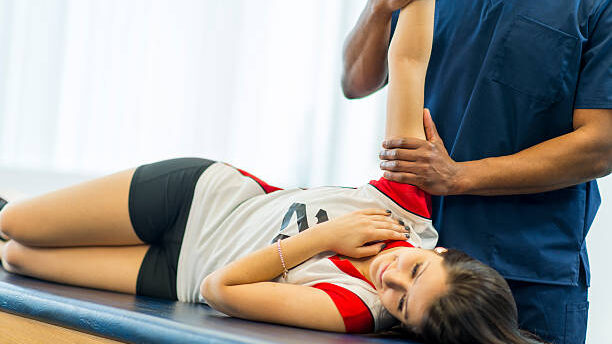Chiropractic care plays a vital role in sports injury rehabilitation. It offers non-invasive techniques to address injuries, such as spinal adjustments, joint mobilization, soft tissue therapy, and rehabilitative exercises. Chiropractors help athletes recover from training sessions and competitions more efficiently, by focusing on the musculoskeletal system. Reducing the risk of overuse injuries, and enhance long-term health and performance. This approach combines principles of chiropractic care with an understanding of the neuromusculoskeletal system. Facilitating injury prevention, rehabilitation, and overall performance enhancement. This article will delve into why chiropractic care is an essential component of comprehensive sports injury management.

Understanding the Anatomy of Sports Injuries
Chiropractic care is an essential aspect of sports injury rehabilitation. Sports activities often subject the body to intense physical stress. Leading to strains, sprains, and misalignments that can affect the spine, joints, and muscles, disrupting the body’s natural balance. Chiropractors specialize in identifying and correcting these misalignments. They offer targeted treatments that go beyond merely alleviating symptoms, aiming for comprehensive rehabilitation. Chiropractic care lies the practice of spinal adjustments, a technique honed to perfection for addressing sports-related injuries. By applying controlled force to specific joints, chiropractors realign the spine, restoring balance and promoting natural healing. This approach not only aids in pain management but also enhances overall mobility. Which is crucial for athletes aiming to regain peak performance.
Holistic Healing: Beyond Symptom Relief
Chiropractors distinguish themselves through a holistic healing approach that goes beyond symptomatic relief. While traditional medicine may focus solely on treating the immediate pain, chiropractors consider the entire musculoskeletal system and its interconnectedness. Embracing a holistic perspective in sports injury rehabilitation not only expedites recovery, but also significantly reduces the risk of recurring injuries. Chiropractors emphasize the importance of addressing the root causes. Also, empowering individuals to regain control over their physical well-being and prevent future setbacks. Chiropractic adjustments are instrumental in unlocking an athlete’s full potential by fostering a harmonious connection between body and mind.
A holistic approach to sports injury rehabilitation is recommended for therapists. Holistic sports medicine goes beyond traditional injury treatment and focuses on the overall well-being of athletes. Chiropractic care is a holistic approach that offers many benefits to sports injury recovery. Chiropractic techniques and spinal manipulation can treat the root cause of the injury. Reducing pain, speed up recovery, and prevent future injuries. Holistic remedies such as chiropractic care, osteopathic manipulation, acupuncture, and deep breathing can help restore tissue movement. Modulating pain, balance hormone levels, and increase blood flow, according to Dr. Dan Williams. It provide comprehensive support encompassing physical, mental, and nutritional aspects. Doctors empower athletes of all ages to reach their full potential, prevent injuries, and improve their overall well-being
Functional Rehabilitation: Restoring Optimal Functionality
Functional rehabilitation is a comprehensive approach to restoring optimal functionality in individuals recovering from sports injuries. It combines various techniques, including strength, flexibility, and agility training. Also, coordination of body parts and motion to prepare the athlete for a safe and efficient return to their sport. This restoration program is designed to provide comprehensive treatment of an injury in an athlete. With its goal of returning the individual to full participation at the prior level of activity. Functional rehabilitation is best provided with a team approach. The program also incorporates agility and proprioceptive/kinesthetic training. In which it enables the athlete to participate at preinjury levels of activity while reducing the risk of re-injury.
Nutritional Guidance: Fueling the Healing Process
Nutritional guidance plays a crucial role in injury recovery and rehabilitation. An adequate and balanced diet is essential for providing key nutrients for wound healing and preventing muscle atrophy according to Sousana K. Papadopoulou. “Rehabilitation nutrition” for injury recovery of athletes is similar to sports nutrition. It aims to achieve the fastest healing and return to competition using the most effective resources. Combining lean protein, fresh fruits and vegetables, complex carbohydrates, and healthy fats will properly fuel a healing body. According to Maryke Louw, anti-inflammatory foods can help counteract the body’s natural inflammatory response to injury.
Additionally, the mind-body connection is important in sports injury rehabilitation, as psychological factors can either delay or enhance recovery, according to Dr. Leigh Breen. The decision to return a player to sport typically involves gradual increased degrees of physical activity. The role of a chiropractor in sports injury rehabilitation is crucial, as they address musculoskeletal imbalances. Promoting proper biomechanics, and enhance joint mobility, muscle flexibility, and neuromuscular coordination. It focuses on the neuromusculoskeletal system and its optimization for athletic performance. Sports chiropractic care has emerged as a critical component of the healthcare management of athletes.
Preventive Care: Safeguarding Future Performance
Preventive care is essential for safeguarding the future performance of athletes. According to Dr. Lambros Lambrou, chiropractors can help prevent sports injuries by addressing spinal misalignments. It enhances their range of motion, and boosting energy, thus reducing the risk of injury during athletic activities. Additionally, regular chiropractic care can lead to increased flexibility and reduced muscle stiffness. While improving muscle balance, all of which contribute to injury prevention. By promoting proper biomechanics and musculoskeletal balance, chiropractors help athletes maintain their physical health. It reduces the risk of overuse injuries, and enhance long-term performance, according to Shun Zhe Piong. Furthermore, chiropractic care can accelerate the healing process. Thus, shortening the recovery time and helping athletes return to their sport faster.
In addition to injury prevention, chiropractic care can also contribute to improved athletic performance. Chiropractors addresses musculoskeletal imbalances and promoting proper biomechanics. Helping athletes recover from training sessions and competitions more efficiently, ultimately leading to improved athletic performance. Chiropractic care can also reduce pain, speed up injury recovery, and improve sleep health. All of which are essential for maintaining peak performance. Moreover, chiropractors can help athletes improve muscle balance, remove nerve interference, and enhance flexibility. Thus, contributing to better overall performance and reducing the risk of future injuries. According to Andrew L. Miners, integrating chiropractic care into an athlete’s healthcare regimen may be beneficial for injury prevention and also for enhancing athletic performance and overall well-being.

